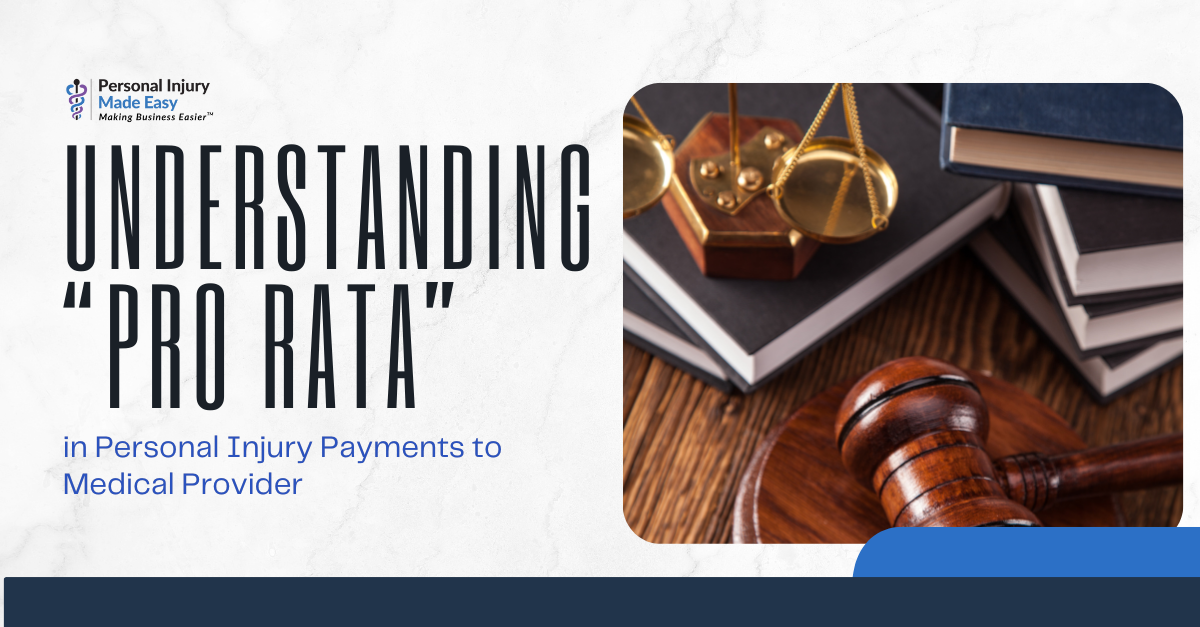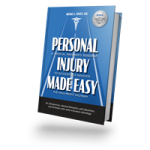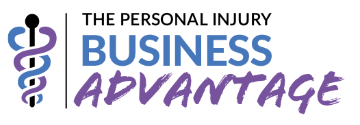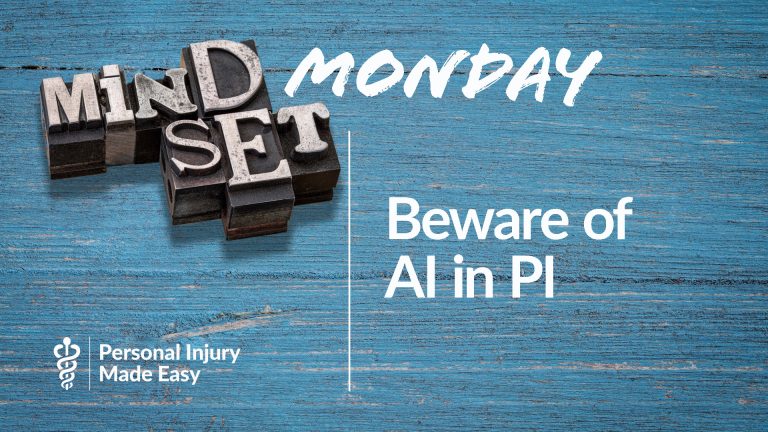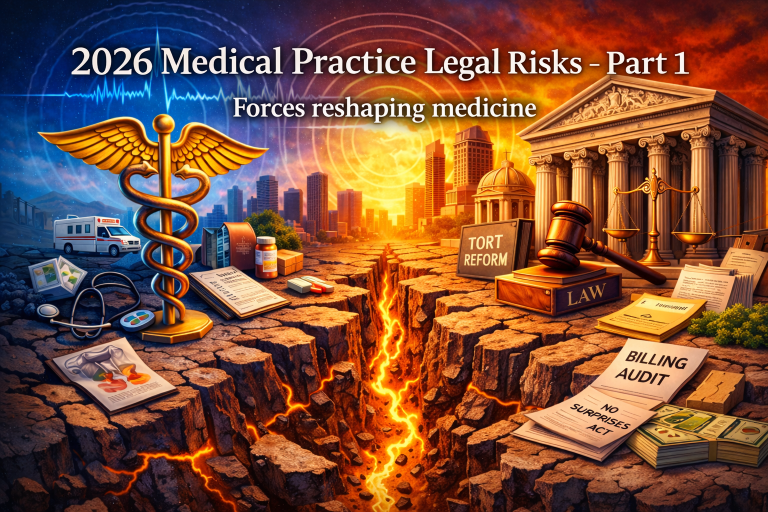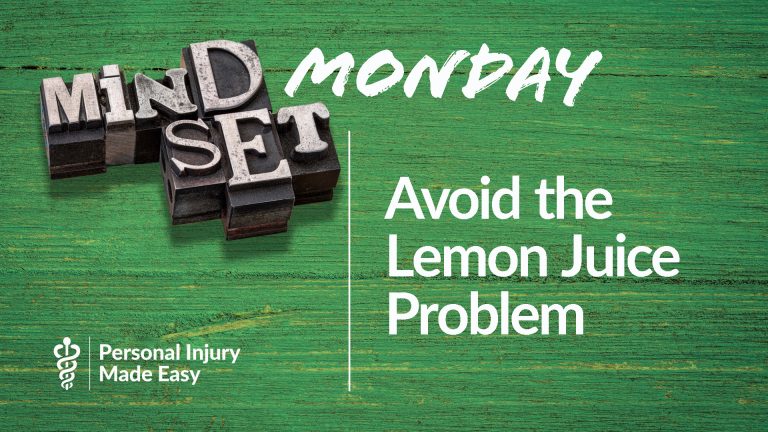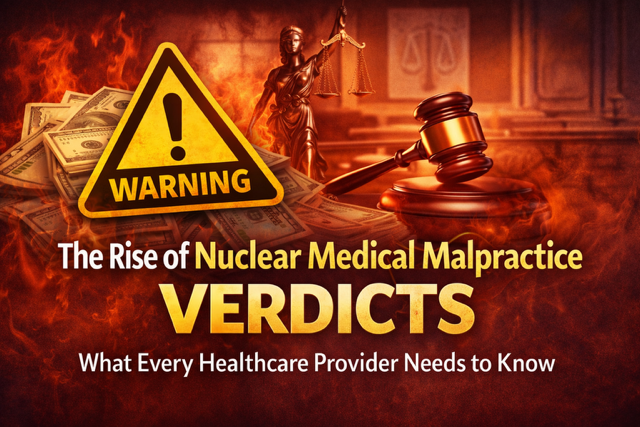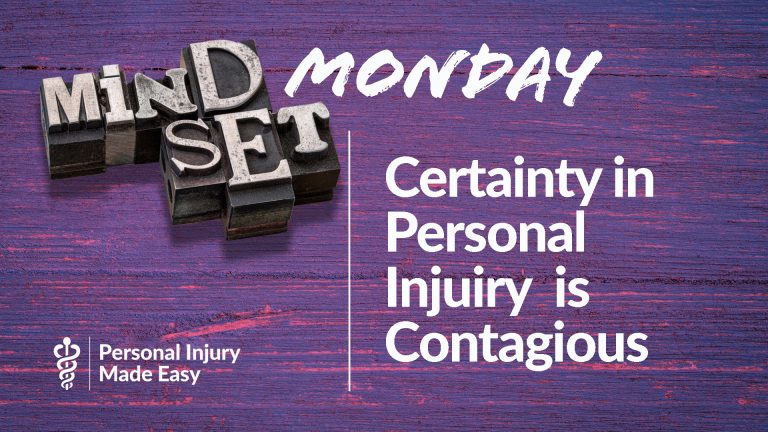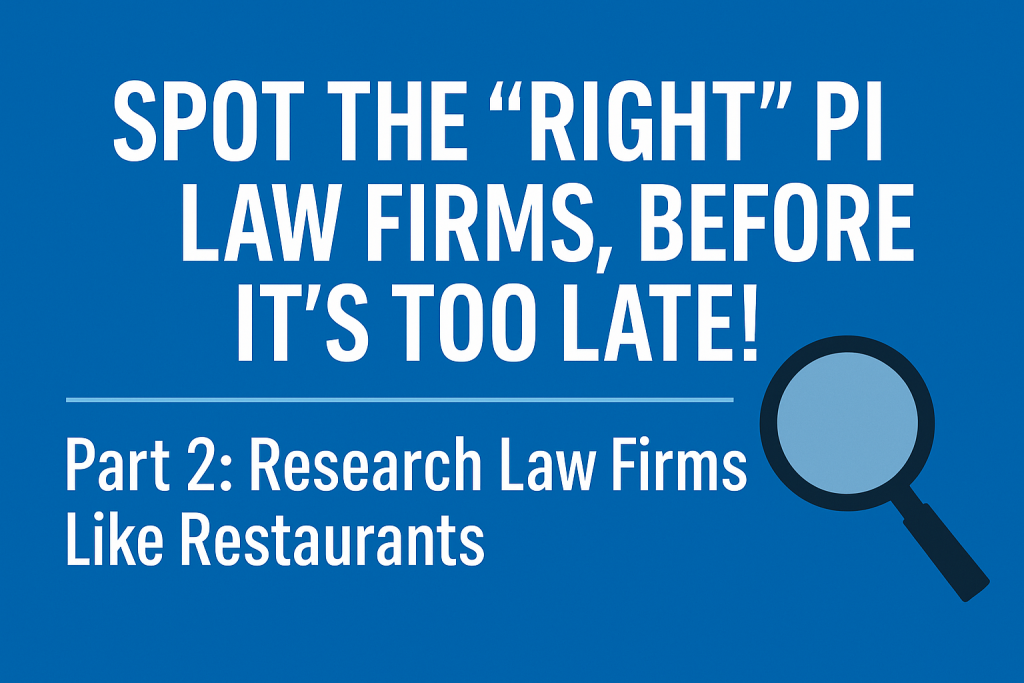
Part 2 of 6: Beneath the Surface: Research Personal Injury Law Firms Like Restaurants
To You Avoid the Bitter Aftertaste of Bad Law Firms
So far in this series, we’ve started you on a solid foundation for vetting attorneys.
- In Part 1, we scoped the surface: evaluating law firm size, negotiator personality, and geographic presence.
Now, in Part 2, we’re going to dig deeper. We’ll explore how what you’re told by a personal injury (PI) law firm about themselves may not always be true, and how to catch early warning signs. We’ll cover background checks you can, and must, do yourself: inspecting websites, checking bar records, and reading third-party reviews.
To help you think about this intuitively, I want you to imagine researching a law firm the way you research a new restaurant, or even one you haven’t visited in a while.
Why?
Because just like you want to avoid a bad meal or a disappointing dining experience, you definitely want to avoid the bitter aftertaste of working with a bad law firm. One bad PI case can hurt, but a bad PI relationship can cost you thousands or hundreds of thousands and erode your professional credibility.
A restaurant has a sign out front, décor in the lobby, and inviting aromas from the kitchen. But if you’ve ever chosen a place to eat based only on appearances, you know how fast things can go wrong, and how quickly you regret your choice.
To move from the possibility of a good PI experience to a probability, you must go beyond the surface flash and do some background work. Because with law firms, just like restaurants, the most important truths often lie behind the kitchen door.
And no, you don’t need to be a detective. Just a medical office that values your time, your staff’s sanity, and your financial survival.
Let’s explore three practical ways to vet law firms like you’d vet a place to eat—because your professional appetite deserves high-quality service.
1. The Menu Tells You What They Specialize In (Law Firm Website & Practice Focus)
Think of a law firm’s website as their menu. If it offers Japanese sushi, Texas barbecue, Italian pasta, and Buffalo burgers all under one roof. What does that tell you?
They’re trying to please everyone, and probably not excelling at any one thing.
It’s the same with law firms. If their site lists personal injury alongside immigration, family law, estate planning, and criminal defense, PI is probably not their main dish. It’s a side hustle. Something they added after an initial success or to keep existing clients from going elsewhere.
But real PI success, for both patient financial outcomes and provider reimbursement, requires specialization. Maximizing case value, defending medical bills, building pain and suffering narratives, and navigating insurer tactics isn’t taught in law school. It’s learned through focused, field-tested experience. The real pros in PI as a law firm, do nothing else.
A generalist firm will likely treat you like a generic vendor rather than an essential asset for a PI case recovery. They often won’t know medical lien law in depth, misstate legal authority, and believe all the myths that lead to low medical provider bill pays.
Now, if an attorney is new to PI but conveys honesty and a willingness to learn, that’s different. You may even know more than they do, which gives you leverage and a chance to shape the relationship. But don’t mistake enthusiasm for expertise. Know what you’re ordering and what kitchen it’s coming from so you can set realistic expectations.
2. Check the Grade Before You Order (Bar Records & Disciplinary History)
Would you eat at a place with a “C” rating from the health department? Probably not.
So why work with a law firm that has public records of malpractice, ethics violations, or trust account mishandling?
Your state bar association, or in some states your State Supreme Court website, is your version of a health inspector’s report. Use it. Look up the attorney handling the case, as well as the managing partner. What you find (or don’t find) can influence your choice of relationship.
If you see sanctions, suspensions, or documented financial misconduct, leave the table.
Repeated violations like failure to pay liens, improper trust account management, or misleading clients aren’t accidents. They’re patterns. And if they’ve mishandled another provider’s bills, or stiffed their own clients on disbursements, they’ll likely mishandle or stiff yours too.
A clean record isn’t a guarantee of integrity. But a dirty one is almost always a dealbreaker.
Before you hand them your patient’s care or agree to take on one of their clients, make sure their kitchen and record is clean.
3. Read the Online Reviews (Consumer Feedback Beyond Testimonials)
Restaurant owners don’t post bad reviews on their websites, and neither do law firms.
Skip the website testimonials. Instead, check Google Reviews, Avvo, Yelp, Facebook, and other third-party sources for real, unfiltered client feedback.
You’re not looking for perfection. You’re looking for patterns.
Do multiple reviews mention poor communication, surprise fees, long delays, or bad outcomes? That’s a red light.
Do several reviews praise responsiveness, transparency, and professionalism? That’s a green light, or at least a yellow light worth exploring further.
And don’t just read the reviews, watch how the firm responds. Do they address criticism respectfully? Offer solutions? Or do they get defensive and combative?
How a firm handles criticism under pressure tells you far more than any billboard or polished bio ever will.
Conclusion: Trust Your Gut, But Back It with Facts (Trust, But Verify)
You can’t afford to “try out” law firms like you try a new dinner spot. These aren’t $100 meals. These are $1,500 to $150,000 bills. It may start with one patient, but over time a firm can affect dozens or even hundreds of patients and bills.
Don’t hope for a good experience. Engineer one.
Do your research. Look beneath the surface. Move from possible to probable. That’s what you do when you’re spending your hard-earned money dining out. It should matter even more when it involves your time, your team, and your practice’s profitability.
Treat your PI relationships like fine dining: check the menu, inspect the kitchen, read the reviews. And if something doesn’t sit right, either walk away or monitor the experience closely and constantly.
You’re not just choosing a law firm. You’re choosing a patient and profit impact.
That will do it for Part 2 of this six-part series. Get ready for Part 3!




